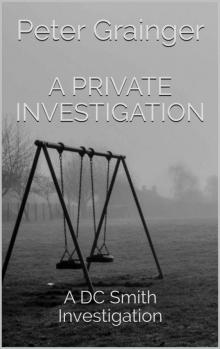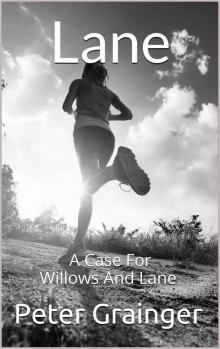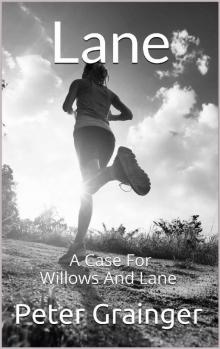- Home
- Peter Grainger
Persons of Interest: A DC Smith Investigation Page 11
Persons of Interest: A DC Smith Investigation Read online
Page 11
Waters said, ‘I’ll bet his mates were impressed!’
Smith was silent for a moment.
‘Well, some of them were, I expect. In 1917 he won the Military Cross.’
‘Oh. That’s good, isn’t it?’
‘Yes, fairly good.’
‘What happened to him?’
‘He nearly made it. He was killed by a mortar in September 1918. His sister kept the diaries for fifty years, and no-one knew they existed until she died. They got published then. But the point is, this was a man who didn’t lose sight of why he was fighting, even in the thick of it. We have to have a reason for what we’re doing if it’s to mean anything - otherwise it’s just a mindless existence.’
Waters watched an orange-brown butterfly dance past, heading from one patch of gorse flowers to the next. He had no idea what sort it was – he knew nothing about butterflies apart from the mundane basics of a school biology lesson.
Smith said, ‘So, what’s up? You haven’t been yourself for a week or two.’
Waters had watched Smith questioning people a number of times, and it felt a little odd, to say the least, to be on the receiving end without any warning. He thought about asking for a solicitor to see if he could avoid it with humour but decided against that.
‘Nothing. I’m OK.’
‘Only you haven’t mentioned Clare for a while either, so I wondered if it was anything to do that.’
What was the point? He had lasted all of five seconds, but now found that he didn’t know what to say about her.
Smith said, ‘Trouble in paradise?’ - this time with another look at Waters.
‘I suppose so. We’ve had a couple of frank exchanges of views, lately.’
‘Oh dear – that’s dangerously close to exchanges of frank views. But I’m sorry to hear that. Is it job-related? I don’t need to know about anything else – and you realise that I’m asking only as your superior officer, concerned about your operational effectiveness.’
Waters thought, anyone listening and not knowing would find that completely convincing, and perhaps a little chilling.
He said, ‘I suppose it is, indirectly. I’ve got this decision to make about staying on the programme or applying for something here in Lake. It’s brought up a few issues.’
‘If you’re thinking about staying on – not that I’m saying you should – surely she’d be pleased?’
‘Well, it’s not just that. I think the romance of going out with a detective is wearing off.’
‘You mean it’s lasted this long?’
Now it was Waters staring philosophically into the distance and saying nothing.
Smith said, ‘She’s quite young, isn’t she?’
‘Nineteen next month. Why?’
‘Oh, I don’t hold that against her or anyone. But, well, it’s not the easiest job to marry into – I know I’m sort of jumping ahead there, but... Anyway, you must have realized that already. Ladies like your mother and my wife, they’re the exception rather than the rule, in my experience. And young women these days have different agendas, as well. I don’t envy you having to sort it all out.’
‘Perhaps the best thing is to stick to people in the job themselves – John and Maggie seem to be OK.’
Smith looked momentarily horrified.
‘Good God, no! That was strictly against my orders. When I saw what was going on I had both of them in the office and said Oi, this has got to stop, you fools, don’t you realise how this will end? But no, they went ahead anyway, without my consent, consumed by the fires of – whatever it is.’
Waters managed a smile for the first time that afternoon.
Smith said, ‘And it seems to have ended alright, which just goes to show that you should probably ignore anything that I say on the subject.’
‘OK, I will.’
Smith gave him the old-fashioned look of disapproval but somehow combined it with a smile.
‘If you need to talk some time...’
‘You know someone who could help and you’d give me their number?’
‘Yes. Very good. Maybe it is time you were off. We’d better go and do some work, then.’
‘Right.’
But Smith did not move. After a few seconds he said, ‘I don’t know quite how it’s happened but you’re good at this job, or you could be pretty quickly. You don’t have to fall down and worship me at this point but one day all this could be yours,’ pointing out over the town below them.
Waters looked from Smith to the panorama, uncertain about how to respond.
Smith said, as he turned back to the car, ‘But there’s a price to pay. There always is.’
As usual, they sat in the car for a few minutes and Smith tested him on what conclusions could be drawn from the observation. Smith was a hard marker but Waters thought he would have been given eight out of ten. The house was a semi, built on a private estate perhaps twenty years ago, but not, Smith said, necessarily privately owned now. The area had gone downhill, had not lived up to the expectations of the first wave of buyers in the boom years of property price inflation, but the people who were prepared to live here these days could not afford mortgages – or would not be given them, not always the same thing – and so lots of these were now rented out and some had been purchased by the local housing association.
Number 36 was not a mess but it was not loved; the double-glazing was of the early aluminium type with hardwood surrounds that had distorted and faded, and at some point the matching door had disappeared, to be replaced by an ugly off-white plastic thing. One upstairs windowsill had a heap of soft toys between the glass and the green venetian blind, and there was other evidence of children in the front garden – a discarded red and yellow plastic tricycle, one of those shiny metal scooters on its side in the long grass and a bucket and spade far from the nearest beach. Parked a long way down the side of the house was an old green Renault estate, and Waters scored a bonus point by writing down the registration before being told to do so.
Smith said, ‘We’re going in virtually blind here – I’ve no idea how this will pan out and not much of an idea what I’m going to say. First of all, she might not live here any more. Second, even if she does, there might be no connection between her, her brother and my phone number, in which case it would all be a horrible - ?’
‘Coincidence.’
‘And then we would have to make our excuses and tiptoe our way out of here. Third, of course, is that the answer to the mystery is here, and we just have to ask the right questions. But I’ll do that – you keep your eyes and ears peeled. ‘Ears peeled’ doesn’t sound right, does it, but I’ve had my daily lyrical moment already – I can’t be expected to do everything. Come on, then.’
Waters had seen it, the momentary look of unadulterated horror on the woman’s face when Smith explained who they were and showed his identification – and in the same few seconds he had seen too the dark circles that recent grief had drawn under her eyes. He knew that she was Sandra Fellowes before she confirmed the fact to Smith on the doorstep.
They followed her along a hallway and into the kitchen at the back of the house – it had two windows, one looking over the back garden, which seemed just a little more desolate than the front one, and the other to the side, overlooking the Renault. Both windows were wide open as if Mrs Fellowes was airing the house. Waters saw Smith’s all-encompassing gaze travel around the kitchen before it settled on the woman herself as she turned to face them, at bay, one hand resting on a work-surface for support. Though nothing of importance had yet been said, the atmosphere in the room was taut – Smith continued to look back at the woman and say nothing.
Eventually Sandra Fellowes said, ‘Where is she, then?’
‘Where is whom, Mrs Fellowes?’
She looked up at Waters briefly, no doubt wondering whether his face would be easier to read – he did his best to ensure that it would not be, though he had no more idea than anyone else what was going on.
The
woman was silent for several more seconds and then she seemed to come to a conclusion.
‘Why are you here?’
‘We’re here to ask you a couple of things about your brother, Lionel. Lionel Everett was your brother, wasn’t he, Mrs Fellowes?’
Her eyelids half closed, she breathed in once and then out slowly, and straightened up.
‘Yes, he was. The police and the prison have already called me half a dozen times. Has something else happened? I mean, I don’t know what else could but... You say you are from Kings Lake?’
She seemed to have got through whatever crisis had been about to overwhelm her – a small, tough, worn-looking woman with a face and hands that seemed older than the rest of her, but who, to use one of Smith’s own boxing metaphors, looked as if she was ready to come out for another round despite the blows that she had already taken.
Smith said, ‘Yes, we are. My colleagues from Huntingdon, the ones that you have already spoken to, are in the early stages of the investigation. Obviously they are trying to find out what the motives were for such a vicious attack. We are talking to everyone who knew Lionel.’
Mrs Fellowes turned away from them, reached into the sink and tipped out the water in a washing up bowl. The draining board was empty and had already been wiped over – Waters looked at the rest of the kitchen then and saw that although nothing had been new in it for a long time, everything was in its proper place and clean enough.
‘He was locked up with a bunch of animals and lunatics – good luck with finding a motive in that lot. But we don’t know anything. You’re wasting your time here.’
She was still looking away from them – Waters caught the brief glance from Smith, a glance that said, oh, I don’t think we are, Mrs Fellowes...
‘Did you have much contact with Lionel when he was in Littlemoor? Any visits or phone calls or letters?’
She faced Smith then, crossing her arms.
‘I visited him once after he first went in. He told me not to come any more, didn’t want me or the kids in a place like that. He said that was it, he’d do his sentence and then he was done with it all. He wasn’t one for writing letters, I only had one, maybe two. As for him phoning up, you must be having a laugh. What do you think it’s like in there, a bloody holiday camp?’
Waters didn’t know much about boxing but he knew more than he did last year. Smith was a counter puncher – he liked nothing better than having an opponent coming forward on the attack, opening themselves up.
‘Mrs Fellowes, I was there only the day before yesterday – I know exactly what it’s like. Still, Lionel knew that as well, didn’t he? It wasn’t his first stay, was it, or even his second. I didn’t know him but he doesn’t strike me as the sort who would be whingeing about it – he would just get on and do the time, wouldn’t he?’
It was an odd, back-handed compliment to her brother; she accepted it as such and nodded.
‘You mentioned letters – were these recent ones? In the past few weeks, say?’
‘No. The last one would be a year ago at least.’
‘And you’ve had no other contact with him. Not heard from anyone who was in there with him, no unexpected visitors?’
She shook her head, her arms still folded, waiting for Smith to end it.
‘Is anyone else at home today?’
Her smile was a bitter one.
‘If you’re asking about Jack, he’s long gone, and I don’t know where.’
Smith acknowledged her sharpness.
‘But you seem to be managing alright. What about the children?’
He was far out of the reasonable-questions territory now but Mrs Fellowes knew the game – she had had policemen in her kitchen before.
‘They’re all at school, and they’re all doing well. I have their latest reports if you’d like to see them.’
‘Is it three or four that you have?’
‘Just the four.’
‘And the oldest must be...?’
She went to answer and something caught in her throat. She swallowed it down and answered, ‘Sixteen.’
‘Sixteen? What an age, eh? Leaving this year, then, out into the wide world.’
‘They have to stay on until seventeen now. But she was going into the sixth form anyway.’
She said it defiantly and with some pride but Waters could hear something broken behind the words.
Smith said, ‘OK, thank you, Mrs Fellowes. I’m sorry for intruding at a time like this but, well, it’s what we have to do.’
She nodded and made a small movement towards the door, to show them out.
Smith said then, ‘Is there anything else we can help you with while we’re here?’
‘No. Thank you. I’ve got things to arrange but that’s not your business, no reason for it to be. Solicitors and funerals – that’s how it ends up, isn’t it?’
Smith waited a little longer, and then he stood aside, allowing her to lead them back through the silent house to the front door.
‘Thoughts?’
Smith had wound down the driver’s side window, and Waters had expected a cigarette to be lit but instead a packet of extra strong mints had been taken out of the glove compartment. He had turned down the kind offer but now Smith was noisily enjoying one – there were a thousand ways in which he could test your patience when the mood was upon him.
‘She thought we’d come about something else.’
‘Goodness me, yes – she started like a guilty thing when she realized we were at cross purposes. It might be something but probably isn’t. These people have chao-’ and then he paused. Waters turned to look for an explanation.
‘I’m just considering whether I’m about to make a politically incorrect generalization... Yes, I am. These people have chaotic lives, beyond what most law-abiding, tax-paying citizens can imagine. It’s like a badly-written soap opera with no commercial breaks, it just goes on and on for years, for their whole lives sometimes. You name it, it will happen to them, sooner or later, and they’ll be known to every branch of what are loosely called the support services. There always will be ‘something else’ that the police might be asking about.’
Waters thought about it. It was true of some of the people he had encountered since coming to Kings Lake but not all of them.
‘I didn’t think it was that bad in there. The place was clean, the kids are at school.’
‘Fair points, we see a lot worse. I’d say she was a half-decent woman. Some of them are – it makes you wonder, sometimes. But that just makes me worry even more about what was going on under the surface. Of course, most likely nothing to do with Lucky Everett, in which case, we’re best off out of it. We’ve got enough to be getting on with... Still, you can’t help wondering what she meant – “Where is she, then?” The daughter? Mum said that she was going into the sixth form – is that significant?’
Waters looked into the rear-view mirror, to see if he could make out the source of the approaching noise – a subdued, grumbling roar. A low, dark blue sports car cornered into Hill Avenue and came too quickly along the road towards them. Smith had noticed it by now and had turned to watch its approach. It passed them, slowing down but the noise increasing as the driver worked down through the gearbox. They watched it move away then, taking another corner to the right and out of sight.
Smith said, ‘It’s either stolen or he’s very lost. We could report it but then we might have to pursue it. I don’t fancy the old girl’s chances.’
‘What was it?’
‘You mean apart from blue?’
Waters didn’t bite – the car jokes had worn off now.
‘Well, it’s not the sort of vehicle that the villains I have to work with usually drive but I’d say that was some sort of Ferrari. And I’d also say that he’s coming back – look.’
The car had reappeared at the bend where it had turned out of sight, being driven more slowly now. It travelled back towards them, and they waited and watched – the windows had some
sort of tint or reflective coating and it was impossible to see the driver. When it was some thirty yards distant, it paused in the middle of the road for a few seconds and then pulled over on the driver’s side, the broad, fat front tyre bumping up onto the kerb.
Waters and Smith looked briefly at each other and then back at the car.
Smith said, ‘Be funny if he was going to Mrs Fellowes, wouldn’t it?’
The door opened and a hand appeared on the roof, followed by a pale arm and then by a blonde head, the hair cropped short but stylishly so; the girl seemed to unwind herself out of the low-slung vehicle because she was tall, perhaps very tall, and very thin – the kind of thin that even fashion magazines call slender. The short-sleeved T shirt matched the blue of the car, and the jeans were tight from hip to ankle – they could see that when she walked away from the Ferrari, as well as the silver platform shoes that must have added at least four inches to her height. But she didn’t totter in them as she came a few yards along the opposite pavement towards them before turning into the drive where the old Renault was parked. Of her face, they could see little – she wore a pair of large sunglasses with fluorescent pink frames.
Smith said, ‘I think we could arrest her for the shoes.’
Waters watched her to the front door at which they had knocked themselves not twenty minutes before. She tapped on it, turned and looked up and down the street but did not seem to notice the two of them.
Smith continued, ‘I mean, it must be some sort of offence driving around in heels like that. Did you bring the fluffy handcuffs? I can’t see her coming quietly in a standard station-issue pair.’
The door opened and she went in immediately – Waters caught a glimpse of Sandra Fellowes, her mouth open, saying something to her latest visitor.
Waters said, ‘Not the first time they’ve met. But if you’d said to me, what sort of car and what sort of person is least likely to turn up and visit Lionel Everett’s sister, what just happened wouldn’t be a million miles from it. I wonder who she is.’
‘Yes, me too. How on earth can we find out?’

 Persons of Interest
Persons of Interest A Private Investigation
A Private Investigation Songbird
Songbird On Eden Street
On Eden Street An Accidental Death
An Accidental Death Time and Tide
Time and Tide An Accidental Death: A DC Smith Investigation
An Accidental Death: A DC Smith Investigation In This Bright Future
In This Bright Future Lane: A Case For Willows And Lane
Lane: A Case For Willows And Lane The Rags of Time: A DC Smith Investigation
The Rags of Time: A DC Smith Investigation Luck and Judgement
Luck and Judgement Persons of Interest: A DC Smith Investigation
Persons of Interest: A DC Smith Investigation Lane
Lane But For The Grace
But For The Grace Time and Tide: A DC Smith Investigation
Time and Tide: A DC Smith Investigation In This Bright Future: A DC Smith Investigation
In This Bright Future: A DC Smith Investigation The Rags of Time
The Rags of Time But For The Grace: A DC Smith Investigation
But For The Grace: A DC Smith Investigation Luck and Judgement: A DC Smith Investigation
Luck and Judgement: A DC Smith Investigation